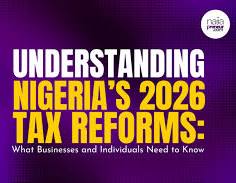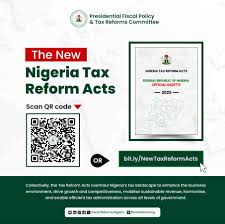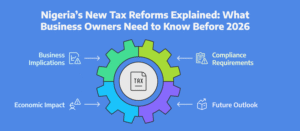
Nigeria’s New Tax Reforms Explained: What Business Owners Need to Know Before 2026
- Business
- 22.09.2025
- No Comment
- 259
On June 26, 2025, President Bola Tinubu signed four landmark tax laws designed to make paying taxes in Nigeria easier, fairer, and more transparent. These reforms take effect from January 1, 2026, giving individuals and businesses six months to prepare for the changes.
The new rules affect everyone — from salaried employees and freelancers to entrepreneurs and finance leads. Understanding these changes now will help you track and report your money correctly when the new system begins.

This guide explains what’s changing, who it affects, and how you can prepare your business and personal finances for a smoother transition.
Here’s a breakdown of the four new tax laws and what they mean in everyday terms:
1. Nigeria Tax Act (Ease of Doing Business)
This law consolidates over 50 different taxes into one simplified tax code.
- Before: Businesses paid multiple confusing taxes at federal, state, and local levels.
- Now: These taxes are removed or merged into one, making it easier to know what you owe and to whom.
2. Tax Administration Act
This law sets uniform rules for how taxes are collected nationwide.
- No more differences between how Lagos or Kano collects tax.
- It promotes digital processes instead of paperwork, reducing delays and errors.
3. Nigeria Revenue Service (NRS) Act
This law replaces the old FIRS with a new, independent agency — the Nigeria Revenue Service (NRS).
- The NRS will be faster and results-driven.
- It will rely on data, automation, and digital platforms to improve compliance and transparency.
4. Joint Revenue Board Act
This law strengthens cooperation between federal and state tax bodies.
- It sets up a Tax Ombudsman and Tax Appeal Tribunal, giving taxpayers a proper channel to resolve disputes.

What Business Owners Need to Know
These tax reforms bring major benefits and responsibilities for Nigerian businesses. Here’s what you need to know:
1. Tax Relief for Businesses
- No Company Income Tax for Businesses Earning ₦50M or Less: Previously, the exemption threshold was ₦25M. If your annual turnover is ₦50 million or less, you’re now exempt from paying company income tax.
- Reduced Company Income Tax (CIT) for Larger Businesses: For companies above the ₦50M threshold, the rate drops from 30% to 25%.
Implication: Review your turnover. If you fall within the ₦50M exemption, you can reinvest more of your profits. Larger businesses also gain from a 5% CIT reduction.
2. Tax Relief for Employees
- Tax-Free Termination Packages: The first ₦50 million of any termination package is now tax-free.
- More Generous PAYE Relief: If you earn ₦1 million/year (₦83,000/month) or less, you will no longer pay PAYE tax. Those earning up to ₦1.7 million/month will also see reduced PAYE rates.
Implication: Employees take home more pay, while employers must update payroll systems to reflect the changes.
3. Tax Compliance for International Remote Workers
The new laws clearly define how remote income is taxed, especially for freelancers and employees working for foreign companies from Nigeria:
- Register with the state tax authority.
- Declare income in Naira equivalent.
- Pay personal income tax based on applicable rates.
Data Sharing: Nigeria participates in the OECD’s Common Reporting Standard (CRS). The CBN also shares data from BVN-linked accounts with tax authorities. Remote workers receiving foreign inflows should ensure full transparency.

Implication: Freelancers and gig workers must declare all income accurately and understand their obligations to avoid penalties.
4. Zero VAT on Essentials
Essential items like food, healthcare, education, electricity, and baby products are now exempt from VAT.
Implication: Consumers save more on essentials. Businesses in these sectors simplify pricing and improve customer trust.
What You Should Do Now
- Review your financial records: Ensure all expense data is accurate, updated, and easy to retrieve.
- Centralise your tax documentation: Use platforms like Flex Finance to store receipts, invoices, and approvals in one place.
- Automate spend tracking: With Flex Finance, every expense is categorised and auditable, making compliance easier ahead of the new regime.
How Flex Finance Helps You Stay Compliant
The tax reforms reward transparency and digital compliance — exactly what Flex Finance was built for. Flex helps you:
- Track all expenses with digital proof in one dashboard.
- Maintain clean, centralised records of financial activity.
- Store receipts digitally to avoid lost paperwork.
- Tag transactions to simplify reporting.
- See tax-relevant spend in real time.
- Generate real-time reports for auditors and tax authorities.
- Export audit-ready reports for tax filing.
📌 Want to be audit-ready before January 2026? Sign Up on Flex Finance.
FAQs
When do the new tax laws take effect?
The new tax laws officially begin on January 1, 2026.
How will these reforms affect how I manage my business finances?
Under the new laws, digital records and clear financial reporting are more important than ever. Start tracking every expense, save receipts digitally, and categorise your spend. Flex Finance helps you do this automatically.
What is the Nigeria Revenue Service (NRS), and how is it different from FIRS?
The NRS replaces FIRS. It’s more independent, technology-driven, and focused on results, reducing manual processes and making tax filing easier for individuals and businesses.
Do I still need to pay Company Income Tax if my business earns less than ₦50 million per year?
No. If your business makes ₦50 million or less annually, you’re exempt from Company Income Tax under the new laws.
Which products are exempt from VAT?
Essential items such as food, rent, electricity, baby products, school fees, and healthcare services no longer attract VAT.
I’m a freelancer. Do these new laws apply to me?
Yes. Freelancers, consultants, and gig workers must declare their income, pay personal income tax, and register with their local tax office.
What if my business is wrongly taxed?
The new reforms introduce a Tax Ombudsman and Tax Appeal Tribunal, giving you an official way to challenge unfair tax treatment.




